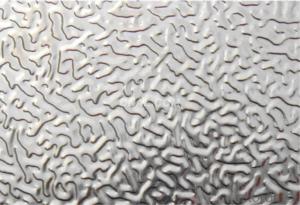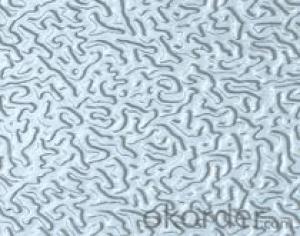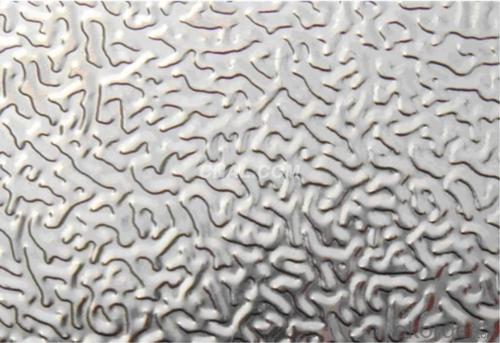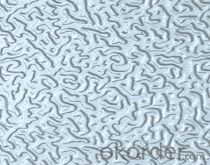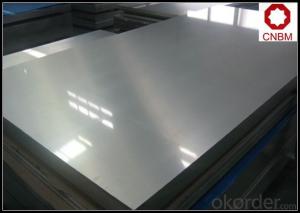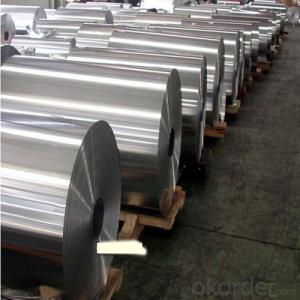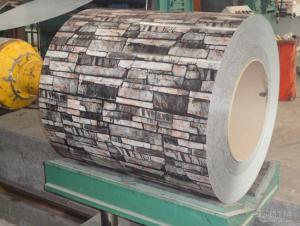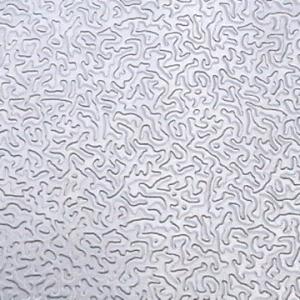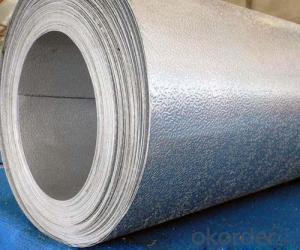Lennox Embossed Aluminum Stucco for Air-Conditionary Coils
- Loading Port:
- Shanghai
- Payment Terms:
- TT OR LC
- Min Order Qty:
- 4 m.t.
- Supply Capability:
- 100000 m.t./month
OKorder Service Pledge
OKorder Financial Service
You Might Also Like
1.Structure of Embossed Aluminum Stucco for Air-Conditionary :
Embossed Aluminum Stucco for Air-Conditionary is widely used in the manufacturing of air-conditionary.Embossed Aluminum Stucco for Air-Conditionary is popular in Africa, Middle East and America markets
2.Main Features of the Embossed Aluminum Stucco for Air-Conditionary:
• Beautiful parten
• High manufacturing accuracy
• High strength of extension and yield
• Well packaged
• No marks, no scratch, no excessive oil
3. Embossed Aluminum Stucco for Air-Conditionary
Alloy: 1050, 1060, 1070, 1100, 3003, 3004, 3005, 3105, 5052, 5083, 5754, 8011, 8006
Temper: H14, H16, H18, H22, H24, H26, H32, O/F
Thickness: 0.2mm-20mm
Width: 10mm-1500mm
4. Production of Embossed Aluminum Stucco for Air-Conditionary
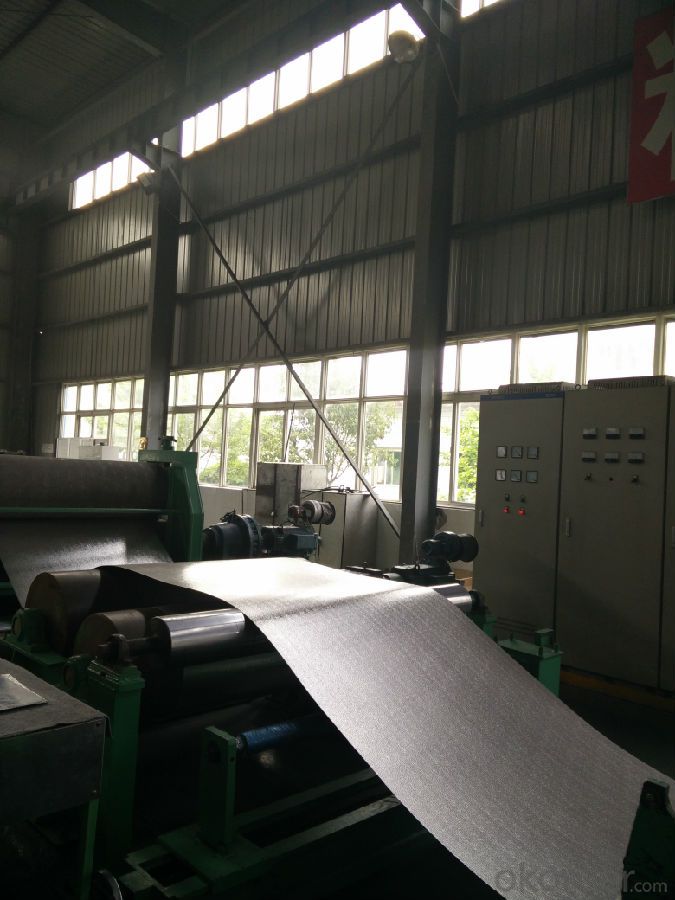
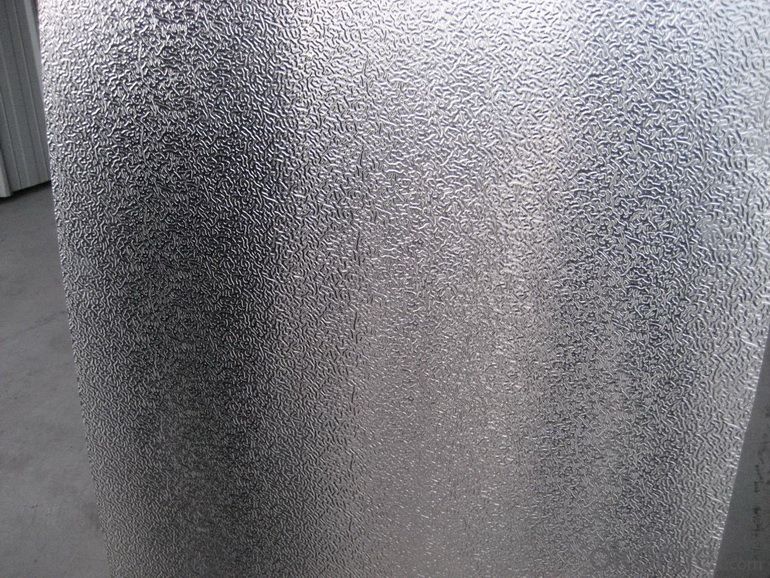
5.FAQ
We have organized several common questions for our clients,may help you sincerely:
① How about your company?
A world class manufacturer & supplier of aluminum coil and alloy blanks. Aluminum production base is comprised of 18 aluminum annealers, 10 coil and foil mills, 4 continuous production lines, 2 hot rolling production line and 3 prepainted lines.
Export 5000 tons per month to Asia, America and Middle East. Always do the best for our clients.
②Can you guarantee the quality of the products?
We are responsible for the quality of materials to get a long-term cooperation with clients in a reasonable period of time and we are glad to arrange and coordinate any third party inspection for you.
③What is the delivery time after purchase?
35 day after receiving client’s deposit or correct LC
- Q: This question asks for criteria or methods to determine if an aluminum coil is of high quality.
- <p>To identify a high-quality aluminum coil, consider the following factors: purity level, which should be 99.5% or higher for most applications; surface finish, ensuring it's smooth and free from defects; thickness consistency, which should be uniform across the entire coil; mechanical properties, such as tensile strength and elongation, that meet industry standards; and adherence to specific alloy grades for particular applications. Additionally, check for certifications from recognized standards organizations and consider the supplier's reputation for quality and consistency.</p>
- Q: How are aluminum coils used in the production of furniture and fixtures?
- Aluminum coils play a crucial role in the production of furniture and fixtures, particularly in the manufacturing of lightweight and durable pieces. These coils are typically made from high-quality aluminum alloys, which offer excellent strength-to-weight ratios and corrosion resistance properties. One common application of aluminum coils in furniture production is in the creation of frames for chairs, tables, and other seating arrangements. The lightweight nature of aluminum makes it easier to handle and transport, while still providing the necessary structural integrity. Aluminum coils can be easily formed, welded, and assembled into various frame designs, allowing for flexibility in creating different furniture styles. Additionally, aluminum coils are often used in the production of fixtures such as cabinets, shelves, and display racks. These coils can be cut, shaped, and bent to create customized components that fit specific design requirements. The corrosion resistance of aluminum ensures that these fixtures can withstand exposure to moisture, making them suitable for both indoor and outdoor settings. Moreover, the use of aluminum coils in furniture and fixture manufacturing provides benefits beyond their physical properties. Aluminum is a highly recyclable material, making it an environmentally friendly choice. It also offers cost-effectiveness due to its durability and low maintenance requirements, reducing long-term expenses for both manufacturers and consumers. In summary, aluminum coils are integral to the production of furniture and fixtures due to their lightweight, durable, and corrosion-resistant properties. Their versatility allows for the creation of various designs, while their recyclability and cost-effectiveness make them a preferred choice in the industry.
- Q: This question is asking for a comparison of various types of aluminum coils, highlighting their unique characteristics and uses.
- <p>Aluminum coils are differentiated by their thickness, alloy composition, surface treatment, and temper. Common types include 1000 series coils with high purity, 3000 series known for formability, 5000 series for corrosion resistance, and 6000 series for strength. Thickness varies from thin gauges used in packaging to thick ones for construction. Surface treatments can include anodizing, painting, or lacquering for enhanced properties. Temper refers to the hardness and strength, with 'H' for hard and 'O' for soft tempers. Each type serves specific industries, such as automotive, aerospace, construction, and packaging.</p>
- Q: Explain the key differences between aluminum coil and steel coil, including material properties and applications.
- <p>Aluminum coil and steel coil are distinct based on their material composition and properties. Aluminum coil is made from aluminum, a lightweight metal known for its corrosion resistance, high thermal and electrical conductivity, and formability. It is commonly used in applications such as packaging, construction, and electrical components. Steel coil, on the other hand, is made from steel, a stronger and more durable metal that offers greater tensile strength and is more resistant to deformation. Steel is widely used in construction, automotive, and manufacturing due to its strength and durability. The choice between aluminum and steel coil depends on the specific requirements of the application, such as weight, strength, and cost considerations.</p>
- Q: How are aluminum coils tested for thickness and flatness?
- Aluminum coils are tested for thickness and flatness using various methods to ensure they meet the required specifications. One common method is the non-destructive eddy current testing, which involves passing an alternating current through a coil and measuring the changes in the magnetic field caused by eddy currents induced in the aluminum. These changes can be used to determine the thickness of the coil. In addition to eddy current testing, ultrasonic testing is also employed to measure the thickness of aluminum coils. Ultrasonic waves are sent through the coil, and the time it takes for the waves to bounce back is measured to determine the thickness. This method is highly accurate and can identify any variations in thickness across the entire coil. To assess the flatness of aluminum coils, a straight edge or a laser beam is often used. The coil is placed on a flat surface, and the straight edge or laser beam is placed across the surface of the coil. Any deviations from a perfectly flat surface can be easily identified by observing the gaps or irregularities between the coil and the straight edge or laser beam. In some cases, advanced technologies like laser profilometry can be used to create a three-dimensional map of the surface of the coil, allowing for a comprehensive analysis of its flatness. This method provides highly detailed information about any variations in flatness across the coil's surface. Overall, aluminum coils undergo rigorous testing procedures to ensure their thickness and flatness meet the required standards. These tests are vital in maintaining the quality and reliability of aluminum coils, especially in applications where precision and consistency are of utmost importance.
- Q: How do aluminum coils contribute to the insulation properties of products?
- Aluminum coils contribute to the insulation properties of products by providing a barrier against heat transfer. The coils are often used as a reflective surface in insulation systems, reflecting thermal radiation and reducing the amount of heat that is conducted through the material. This helps to maintain a more stable and comfortable temperature inside the product, improving its overall insulation effectiveness.
- Q: I would like to order 25 micron diameter 99.99% Aluminum wire required to use for making electrical connections. Only several cm are needed, so I would like to purchase a small spool. Delivery ASAP preferable (overnight or two day shipping would be best). This wire will be attached by hand using epoxy and not using a wire bonder.
- If they can't help, try asking the tech support guys at the wirebond manufacturers and the tool manufacturers. KS in the US and Shinkawa in Japan used to be the big guys. You can search for ultrasonic bond tools. You can also check with superconducting research centers; several private and public ones. Researchers might loan you materials and/or bonding support. BTW, Al critical temp is reportedly about 1.2°K, pretty tough to get that cold! U/S bond wire has 1% silicon, partly for hardness, you can probably bond pure wire though. Key is breaking up the oxide. Maybe bonding at cold temps and/or in vacuum would work. Also, I doubt epoxy would be good or superconducting at the temps. Al filled epoxy is unreliable electrical conductor due to oxide formation. Will be a bear to handle such fine wires without a bonder! Good luck!
- Q: Are aluminum coils suitable for insulation applications?
- Indeed, insulation applications find aluminum coils to be a fitting option. The outstanding thermal conductivity properties of aluminum make it a widely preferred material for insulation purposes. Its ability to effectively deflect heat and cold renders it an efficient choice for insulating applications. What's more, aluminum coils boast lightweight construction, durability, and resistance to corrosion, rendering them suitable for a range of insulation requirements. Their installation is hassle-free, and they offer enduring insulation performance. In summary, aluminum coils emerge as an exceptional selection for insulation applications.
- Q: This question asks for the method to measure the dimensions of an aluminum coil.
- <p>To measure the size of an aluminum coil, you'll need to measure its diameter, width, and thickness. Use a tape measure or a caliper to measure the coil's diameter and width. For the thickness, a micrometer or a coil thickness gauge can be used. Ensure the coil is laid flat and measure at several points to get an average thickness. If the coil is wound, you may need to unroll it partially to take accurate measurements. Always follow the manufacturer's guidelines for your specific measuring tools to ensure accuracy.</p>
- Q: I need ideas on soundproofing a 12' aluminum fishing boat?
- i have a 14 foot aluminum boat and is what me and my dad did is we got some giant indoor outdoor garage carpet mats like they use at stores in front of the doors butt softer. we cut it like we wanted then used indor outdoor carpet glue and stuck it down. we were in 3 foot chop with my dog mesing around and me dropping my tackle box and all kinds of stuff and it was real quiet so that should work for u. also try and drive around on trash day and see if someone is throwind away old carpet that u could salvage and use :) good luck realin in a big one and if you do like the guy above me said and use foam boards make sure there soft. other wise if the move and hit the aluminum they could make some noised.
Send your message to us
Lennox Embossed Aluminum Stucco for Air-Conditionary Coils
- Loading Port:
- Shanghai
- Payment Terms:
- TT OR LC
- Min Order Qty:
- 4 m.t.
- Supply Capability:
- 100000 m.t./month
OKorder Service Pledge
OKorder Financial Service
Similar products
Hot products
Hot Searches
Related keywords
